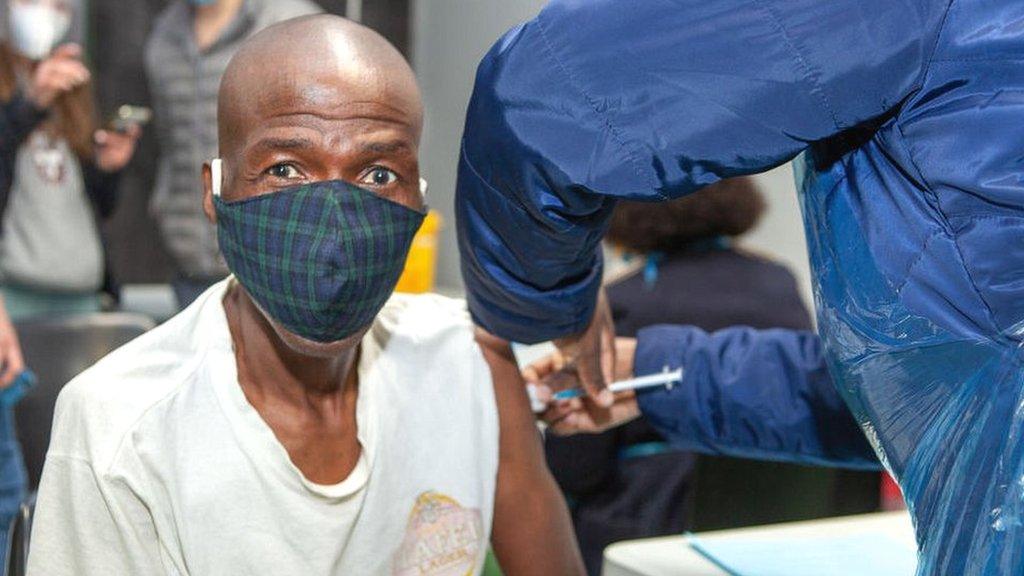Covid vaccine gap: How South Africa hopes to bridge the divide
- Published
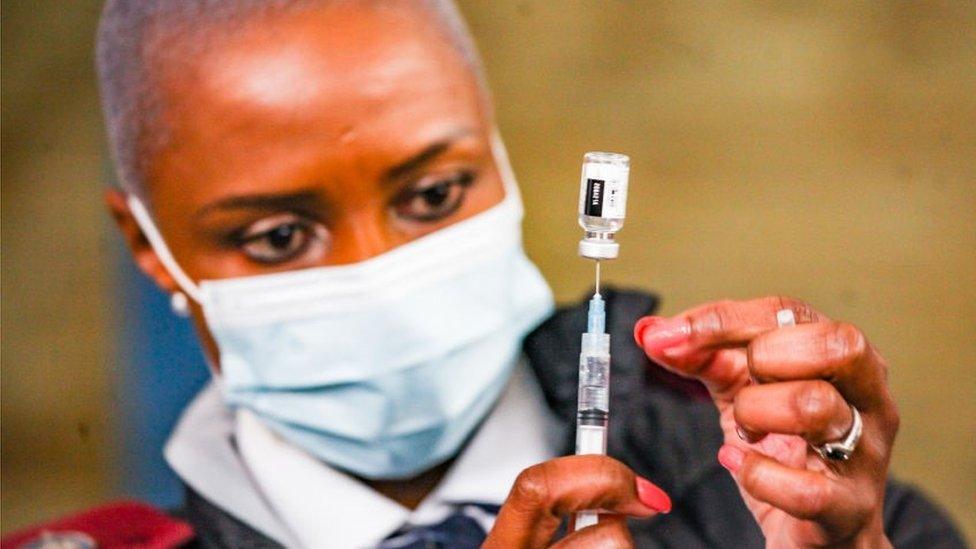
With South Africa's vaccination campaign moving at a snail's pace, President Cyril Ramaphosa has been forced to tighten lockdown restrictions in a bid to contain a third wave of the coronavirus pandemic.
South Africa has vaccinated less than 2% of its population of about 59 million since it started its programme in February.
This is in contrast with the US where almost 46% of the population of more than 330 million has been fully vaccinated.
"Covid is down. The economy is up. America is on the move again," boasted US President Joe Biden in a recent tweet, external.
President Ramaphosa has been forced to:
Order the closure of all schools
Advise people to work from home where possible
Ban all indoor and outdoor gatherings, including weddings
Limit funerals to 50 people
Ban the sale of alcohol to ease pressure on hospitals
Order the closure of all non-essential establishments at 20:00
Introduce a curfew from 21:00 to 04:00.
Hospitals admissions are rising fastest in the economic heartland of Gauteng, and in many places beds have run out.
Devastating wave
A slow vaccination rollout has left millions of people vulnerable to infection.
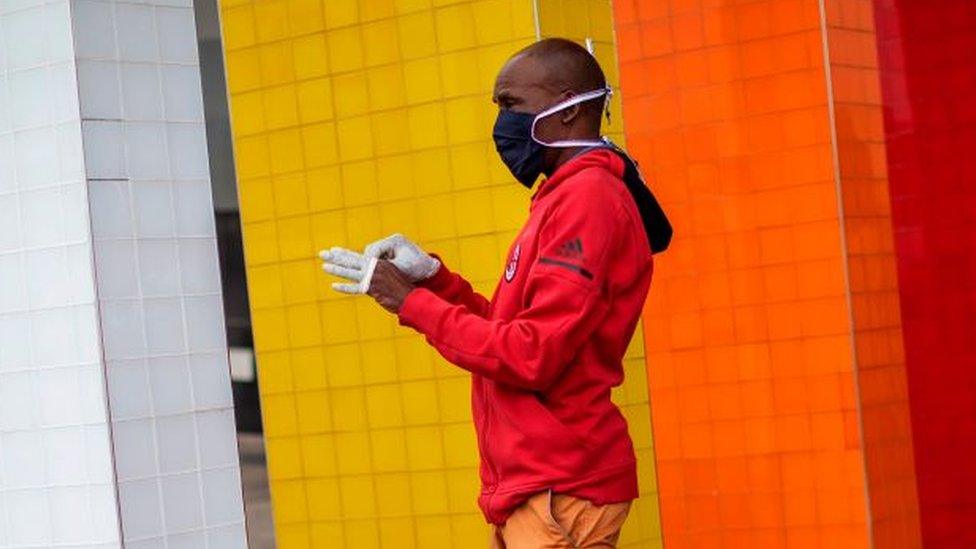
Less than 2% of South Africans have had the jab
The main opposition Democratic Alliance (DA) has condemned it as "sluggish", saying the government would fail to meet its target of vaccinating 40 million people by the end of the year.
The second-biggest opposition party, the Economic Freedom Fighters (EFF), condemned what it called the "utter failure of this government to vaccinate even a million people in the space of over a year". It organised a march last week, demanding Russian and Chinese-manufactured vaccines in addition to the Pfizer and Johnson & Johnson vaccines already in use.
"We are in the grip of a devastating wave," Mr Ramaphosa said in an address to the nation on Sunday night.
"By all indications [it] seems like it will be worse than those that preceded it," he added.

Mr Ramaphosa said the government was concerned about the "rapid spread" of the Delta variant, but evidence suggested that the vaccines being used in South Africa were effective.
He defended the vaccination campaign, saying that nearly 2.7 million people had received a dose and the daily vaccination rate had surpassed 100,000.
Real and rising threat
Other African states - including Namibia, the Democratic Republic of Congo and Uganda - are also witnessing a surge in cases.
Uganda's President Yoweri Museveni called out "vaccine selfishness" in the world but said it would "wake up" Africans to be self-sufficient.
Currently, only five African countries are involved, in a limited way, in the productions of vaccines.
Tunisia and Morocco have companies that can package and label, meanwhile South Africa, Egypt and Senegal can "fill and finish" - which entails big pharmaceutical companies using third parties to fill and prepare vials for distribution.
In Africa less than 1% of the continent's 1.3 billion people have been vaccinated and as a result the pandemic is far from over - in fact it is escalating.
 mapped
mapped
Confirmed cases around the world
Please upgrade your browser to see the full interactive
Source: Johns Hopkins University, national public health agencies
Figures last updated 5 July 2022, 08:59 BST

"The threat of a third wave in Africa is real and rising," Dr Matshidiso Moeti, World Health Organization (WHO) regional director for Africa, said last week.
"It's crucial that we swiftly get vaccines into the arms of Africans at high risk of falling seriously ill and dying of Covid-19," she added.
South Africa and India have been pushing the World Trade Organisation (WTO) to waive intellectual property rights for coronavirus vaccines so that they can become more easily available in the developing world.
"We are tired of waiting in the queue, we want to be at the front," said Mr Ramaphosa in a meeting with French President Emmanuel Macron last month.
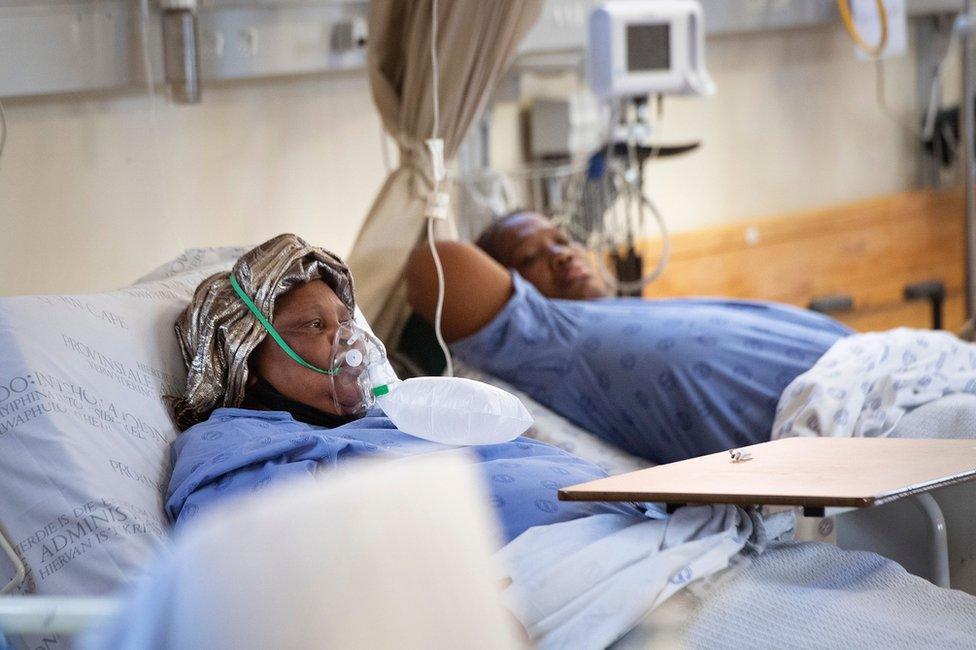
Hospital admissions have been rising sharply in South Africa's economic heartland of Gauteng
The European Union (EU) plans to invest €1bn ($1.1bn; £0.8bn) in vaccine production and access on the continent, external, while a $50bn world vaccination plan has been proposed by the International Monetary Fund chief Kristalina Georgieva.
"Pandemic policy is economic policy. Unless we get out of the health crisis, we cannot see the world economy fully recovering," she told the BBC.
The pressure is yielding results, with Mr Ramaphosa and Mr Macron announcing last week that South Africa would become the continent's first major manufacturer of vaccines.
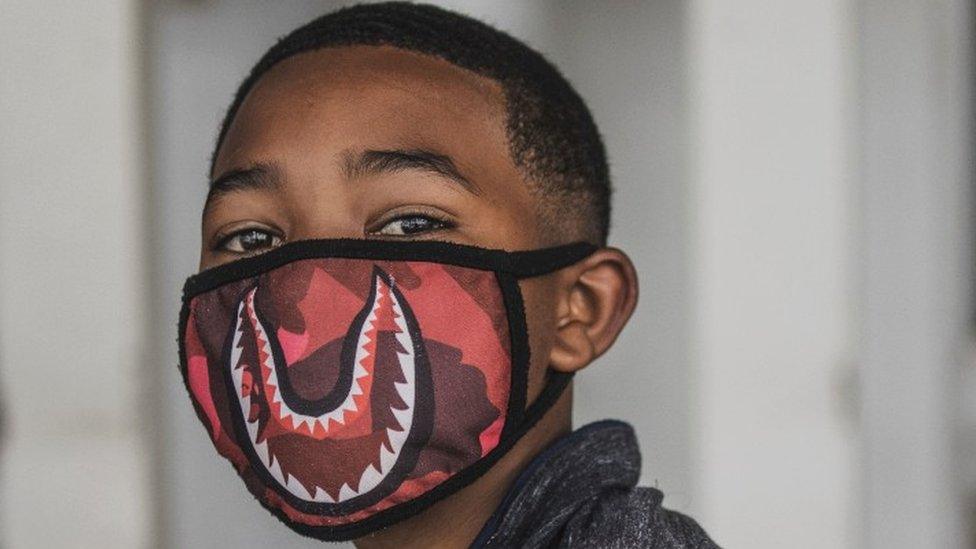
Face coverings are mandatory in South Africa
South African vaccine manufacturer Biovac will partner with Afrigen Biologics, a network of universities, and the Africa Centres for Disease Control and Prevention to establish Africa's first Covid messenger RNA vaccine technology transfer hub - where innovation, production and training will happen, external.
But it could take at least a year to complete, and there is a growing global consensus that in order to beat the pandemic countries in the global south needs greater support - and fast.
Both India and South Africa say the only way to allow for a "fair, equitable and affordable access" to life-saving vaccines is for the WTO to waive an agreement to protect international property rights, called Trade-Related Aspects of IP Rights (Trips).
You can't defer only to vested interests and well-funded lobbies."

The proposal has gained traction after receiving backing from the US, but there is no guarantee that it will go ahead, and there are concerns that businesses hold too much sway.
"You can't defer only to pharmaceutical interests and to vested interests and to well-funded lobbies in the negotiations," said Fatima Hassan, the director of civil society organisation the Health Justice Initiative.
"It needs to be transparent, civil society needs to have a seat at the table", she adds, and wants the waiver expanded beyond vaccines so that testing kits, ventilators and oxygen treatments and more can be made locally by and for poorer nations.
Vital to transfer skills
The EU does not support a Trips waiver and wants compulsory licensing agreements instead - whereby governments produce vaccines without the patent owners' consent, but the owners still exert rights over the patent and are entitled to compensation. Under a patent waiver these restrictions are not in place.
"The EU and other nations opposing this waiver need to stop blocking other countries' efforts to protect their populations in a public health emergency," said Dimitri Eynikel of the medical charity, Médecins Sans Frontières.
He called compulsory licensing "a safeguard that can only bypass patents but not all IP [intellectual property] barriers".
 data in detail
data in detail
*Deaths per 100,000 people
| US | 1,012,833 | 308.6 | 87,030,788 | ||
| Brazil | 672,033 | 318.4 | 32,535,923 | ||
| India | 525,242 | 38.4 | 43,531,650 | ||
| Russia | 373,595 | 258.8 | 18,173,480 | ||
| Mexico | 325,793 | 255.4 | 6,093,835 | ||
| Peru | 213,579 | 657.0 | 3,640,061 | ||
| UK | 177,890 | 266.2 | 22,232,377 | ||
| Italy | 168,604 | 279.6 | 18,805,756 | ||
| Indonesia | 156,758 | 57.9 | 6,095,351 | ||
| France | 146,406 | 218.3 | 30,584,880 | ||
| Iran | 141,404 | 170.5 | 7,240,564 | ||
| Germany | 141,397 | 170.1 | 28,542,484 | ||
| Colombia | 140,070 | 278.3 | 6,175,181 | ||
| Argentina | 129,109 | 287.3 | 9,394,326 | ||
| Poland | 116,435 | 306.6 | 6,016,526 | ||
| Ukraine | 112,459 | 253.4 | 5,040,518 | ||
| Spain | 108,111 | 229.6 | 12,818,184 | ||
| South Africa | 101,812 | 173.9 | 3,995,291 | ||
| Turkey | 99,057 | 118.7 | 15,180,444 | ||
| Romania | 65,755 | 339.7 | 2,927,187 | ||
| Philippines | 60,602 | 56.1 | 3,709,386 | ||
| Chile | 58,617 | 309.3 | 4,030,267 | ||
| Hungary | 46,647 | 477.5 | 1,928,125 | ||
| Vietnam | 43,088 | 44.7 | 10,749,324 | ||
| Canada | 42,001 | 111.7 | 3,958,155 | ||
| Czech Republic | 40,324 | 377.9 | 3,936,870 | ||
| Bulgaria | 37,260 | 534.1 | 1,174,216 | ||
| Malaysia | 35,784 | 112.0 | 4,575,809 | ||
| Ecuador | 35,745 | 205.7 | 913,798 | ||
| Belgium | 31,952 | 278.2 | 4,265,296 | ||
| Japan | 31,328 | 24.8 | 9,405,007 | ||
| Thailand | 30,736 | 44.1 | 4,534,017 | ||
| Pakistan | 30,403 | 14.0 | 1,539,275 | ||
| Greece | 30,327 | 283.0 | 3,729,199 | ||
| Bangladesh | 29,174 | 17.9 | 1,980,974 | ||
| Tunisia | 28,691 | 245.3 | 1,052,180 | ||
| Iraq | 25,247 | 64.2 | 2,359,755 | ||
| Egypt | 24,723 | 24.6 | 515,645 | ||
| South Korea | 24,576 | 47.5 | 18,413,997 | ||
| Portugal | 24,149 | 235.2 | 5,171,236 | ||
| Netherlands | 22,383 | 129.1 | 8,203,898 | ||
| Bolivia | 21,958 | 190.7 | 931,955 | ||
| Slovakia | 20,147 | 369.4 | 2,551,116 | ||
| Austria | 20,068 | 226.1 | 4,499,570 | ||
| Myanmar | 19,434 | 36.0 | 613,659 | ||
| Sweden | 19,124 | 185.9 | 2,519,199 | ||
| Kazakhstan | 19,018 | 102.7 | 1,396,584 | ||
| Paraguay | 18,994 | 269.6 | 660,841 | ||
| Guatemala | 18,616 | 112.1 | 921,146 | ||
| Georgia | 16,841 | 452.7 | 1,660,429 | ||
| Sri Lanka | 16,522 | 75.8 | 664,181 | ||
| Serbia | 16,132 | 232.3 | 2,033,180 | ||
| Morocco | 16,120 | 44.2 | 1,226,246 | ||
| Croatia | 16,082 | 395.4 | 1,151,523 | ||
| Bosnia and Herzegovina | 15,807 | 478.9 | 379,041 | ||
| China | 14,633 | 1.0 | 2,144,566 | ||
| Jordan | 14,068 | 139.3 | 1,700,526 | ||
| Switzerland | 13,833 | 161.3 | 3,759,730 | ||
| Nepal | 11,952 | 41.8 | 979,835 | ||
| Moldova | 11,567 | 435.2 | 520,321 | ||
| Israel | 10,984 | 121.3 | 4,391,275 | ||
| Honduras | 10,906 | 111.9 | 427,718 | ||
| Lebanon | 10,469 | 152.7 | 1,116,798 | ||
| Australia | 10,085 | 39.8 | 8,291,399 | ||
| Azerbaijan | 9,717 | 96.9 | 793,388 | ||
| North Macedonia | 9,327 | 447.7 | 314,501 | ||
| Saudi Arabia | 9,211 | 26.9 | 797,374 | ||
| Lithuania | 9,175 | 329.2 | 1,162,184 | ||
| Armenia | 8,629 | 291.7 | 423,417 | ||
| Cuba | 8,529 | 75.3 | 1,106,167 | ||
| Costa Rica | 8,525 | 168.9 | 904,934 | ||
| Panama | 8,373 | 197.2 | 925,254 | ||
| Afghanistan | 7,725 | 20.3 | 182,793 | ||
| Ethiopia | 7,542 | 6.7 | 489,502 | ||
| Ireland | 7,499 | 151.8 | 1,600,614 | ||
| Uruguay | 7,331 | 211.8 | 957,629 | ||
| Taiwan | 7,025 | 29.5 | 3,893,643 | ||
| Belarus | 6,978 | 73.7 | 982,867 | ||
| Algeria | 6,875 | 16.0 | 266,173 | ||
| Slovenia | 6,655 | 318.7 | 1,041,426 | ||
| Denmark | 6,487 | 111.5 | 3,177,491 | ||
| Libya | 6,430 | 94.9 | 502,189 | ||
| Latvia | 5,860 | 306.4 | 837,182 | ||
| Venezuela | 5,735 | 20.1 | 527,074 | ||
| Palestinian Territories | 5,662 | 120.8 | 662,490 | ||
| Kenya | 5,656 | 10.8 | 334,551 | ||
| Zimbabwe | 5,558 | 38.0 | 255,726 | ||
| Sudan | 4,952 | 11.6 | 62,696 | ||
| Finland | 4,875 | 88.3 | 1,145,610 | ||
| Oman | 4,628 | 93.0 | 390,244 | ||
| Dominican Republic | 4,383 | 40.8 | 611,581 | ||
| El Salvador | 4,150 | 64.3 | 169,646 | ||
| Namibia | 4,065 | 163.0 | 169,247 | ||
| Trinidad and Tobago | 4,013 | 287.7 | 167,495 | ||
| Zambia | 4,007 | 22.4 | 326,259 | ||
| Uganda | 3,621 | 8.2 | 167,979 | ||
| Albania | 3,502 | 122.7 | 282,690 | ||
| Norway | 3,337 | 62.4 | 1,448,679 | ||
| Syria | 3,150 | 18.5 | 55,934 | ||
| Nigeria | 3,144 | 1.6 | 257,637 | ||
| Jamaica | 3,144 | 106.6 | 143,347 | ||
| Kosovo | 3,140 | 175.0 | 229,841 | ||
| Cambodia | 3,056 | 18.5 | 136,296 | ||
| Kyrgyzstan | 2,991 | 46.3 | 201,101 | ||
| Botswana | 2,750 | 119.4 | 322,769 | ||
| Montenegro | 2,729 | 438.6 | 241,190 | ||
| Malawi | 2,646 | 14.2 | 86,600 | ||
| Estonia | 2,591 | 195.3 | 580,114 | ||
| Kuwait | 2,555 | 60.7 | 644,451 | ||
| United Arab Emirates | 2,319 | 23.7 | 952,960 | ||
| Mozambique | 2,212 | 7.3 | 228,226 | ||
| Mongolia | 2,179 | 67.6 | 928,981 | ||
| Yemen | 2,149 | 7.4 | 11,832 | ||
| Senegal | 1,968 | 12.1 | 86,382 | ||
| Cameroon | 1,931 | 7.5 | 120,068 | ||
| Angola | 1,900 | 6.0 | 101,320 | ||
| Uzbekistan | 1,637 | 4.9 | 241,196 | ||
| New Zealand | 1,534 | 31.2 | 1,374,535 | ||
| Bahrain | 1,495 | 91.1 | 631,562 | ||
| Rwanda | 1,460 | 11.6 | 131,270 | ||
| Ghana | 1,452 | 4.8 | 166,546 | ||
| Singapore | 1,419 | 24.9 | 1,473,180 | ||
| Eswatini | 1,416 | 123.3 | 73,148 | ||
| Madagascar | 1,401 | 5.2 | 65,787 | ||
| DR Congo | 1,375 | 1.6 | 91,393 | ||
| Suriname | 1,369 | 235.5 | 80,864 | ||
| Somalia | 1,361 | 8.8 | 26,803 | ||
| Guyana | 1,256 | 160.5 | 67,657 | ||
| Luxembourg | 1,094 | 176.5 | 265,323 | ||
| Cyprus | 1,075 | 89.7 | 515,596 | ||
| Mauritius | 1,004 | 79.3 | 231,036 | ||
| Mauritania | 984 | 21.7 | 60,368 | ||
| Martinique | 965 | 257.0 | 195,912 | ||
| Guadeloupe | 955 | 238.7 | 168,714 | ||
| Fiji | 866 | 97.3 | 65,889 | ||
| Tanzania | 841 | 1.4 | 35,768 | ||
| Haiti | 837 | 7.4 | 31,677 | ||
| Bahamas | 820 | 210.5 | 36,101 | ||
| Réunion | 812 | 91.3 | 422,769 | ||
| Ivory Coast | 805 | 3.1 | 83,679 | ||
| Laos | 757 | 10.6 | 210,313 | ||
| Malta | 748 | 148.8 | 105,407 | ||
| Mali | 737 | 3.7 | 31,176 | ||
| Lesotho | 699 | 32.9 | 33,938 | ||
| Belize | 680 | 174.2 | 64,371 | ||
| Qatar | 679 | 24.0 | 385,163 | ||
| Papua New Guinea | 662 | 7.5 | 44,728 | ||
| French Polynesia | 649 | 232.4 | 73,386 | ||
| Barbados | 477 | 166.2 | 84,919 | ||
| Guinea | 443 | 3.5 | 37,123 | ||
| Cape Verde | 405 | 73.6 | 61,105 | ||
| French Guiana | 401 | 137.9 | 86,911 | ||
| Burkina Faso | 387 | 1.9 | 21,044 | ||
| Congo | 385 | 7.2 | 24,128 | ||
| Saint Lucia | 383 | 209.5 | 27,094 | ||
| Gambia | 365 | 15.5 | 12,002 | ||
| New Caledonia | 313 | 108.8 | 64,337 | ||
| Niger | 310 | 1.3 | 9,031 | ||
| Maldives | 306 | 57.6 | 182,720 | ||
| Gabon | 305 | 14.0 | 47,939 | ||
| Liberia | 294 | 6.0 | 7,497 | ||
| Curaçao | 278 | 176.5 | 44,545 | ||
| Togo | 275 | 3.4 | 37,482 | ||
| Nicaragua | 242 | 3.7 | 14,690 | ||
| Grenada | 232 | 207.1 | 18,376 | ||
| Brunei | 225 | 51.9 | 167,669 | ||
| Aruba | 222 | 208.8 | 41,000 | ||
| Chad | 193 | 1.2 | 7,426 | ||
| Djibouti | 189 | 19.4 | 15,690 | ||
| Mayotte | 187 | 70.3 | 37,958 | ||
| Equatorial Guinea | 183 | 13.5 | 16,114 | ||
| Iceland | 179 | 49.5 | 195,259 | ||
| Channel Islands | 179 | 103.9 | 80,990 | ||
| Guinea-Bissau | 171 | 8.9 | 8,369 | ||
| Seychelles | 167 | 171.1 | 44,847 | ||
| Benin | 163 | 1.4 | 27,216 | ||
| Comoros | 160 | 18.8 | 8,161 | ||
| Andorra | 153 | 198.3 | 44,177 | ||
| Solomon Islands | 153 | 22.8 | 21,544 | ||
| Antigua and Barbuda | 141 | 145.2 | 8,665 | ||
| Bermuda | 140 | 219.0 | 16,162 | ||
| South Sudan | 138 | 1.2 | 17,722 | ||
| Timor-Leste | 133 | 10.3 | 22,959 | ||
| Tajikistan | 125 | 1.3 | 17,786 | ||
| Sierra Leone | 125 | 1.6 | 7,704 | ||
| San Marino | 115 | 339.6 | 18,236 | ||
| St Vincent and the Grenadines | 114 | 103.1 | 9,058 | ||
| Central African Republic | 113 | 2.4 | 14,649 | ||
| Isle of Man | 108 | 127.7 | 36,463 | ||
| Gibraltar | 104 | 308.6 | 19,633 | ||
| Eritrea | 103 | 2.9 | 9,805 | ||
| Sint Maarten | 87 | 213.6 | 10,601 | ||
| Liechtenstein | 85 | 223.6 | 17,935 | ||
| Sao Tome and Principe | 74 | 34.4 | 6,064 | ||
| Dominica | 68 | 94.7 | 14,852 | ||
| Saint Martin | 63 | 165.8 | 10,952 | ||
| British Virgin Islands | 63 | 209.8 | 6,941 | ||
| Monaco | 59 | 151.4 | 13,100 | ||
| Saint Kitts and Nevis | 43 | 81.4 | 6,157 | ||
| Burundi | 38 | 0.3 | 42,731 | ||
| Bonaire, Sint Eustatius and Saba | 37 | 142.4 | 10,405 | ||
| Turks and Caicos Islands | 36 | 94.3 | 6,219 | ||
| Cayman Islands | 29 | 44.7 | 27,594 | ||
| Samoa | 29 | 14.7 | 14,995 | ||
| Faroe Islands | 28 | 57.5 | 34,658 | ||
| Bhutan | 21 | 2.8 | 59,824 | ||
| Greenland | 21 | 37.3 | 11,971 | ||
| Vanuatu | 14 | 4.7 | 11,389 | ||
| Kiribati | 13 | 11.1 | 3,236 | ||
| Diamond Princess cruise ship | 13 | 712 | |||
| Tonga | 12 | 11.5 | 12,301 | ||
| Anguilla | 9 | 60.5 | 3,476 | ||
| Montserrat | 8 | 160.3 | 1,020 | ||
| Wallis and Futuna Islands | 7 | 61.2 | 454 | ||
| Palau | 6 | 33.3 | 5,237 | ||
| Saint Barthelemy | 6 | 60.9 | 4,697 | ||
| MS Zaandam cruise ship | 2 | 9 | |||
| Cook Islands | 1 | 5.7 | 5,774 | ||
| Saint Pierre and Miquelon | 1 | 17.2 | 2,779 | ||
| Falkland Islands | 0 | 0.0 | 1,815 | ||
| Micronesia | 0 | 0.0 | 38 | ||
| Vatican | 0 | 0.0 | 29 | ||
| Marshall Islands | 0 | 0.0 | 18 | ||
| Antarctica | 0 | 11 | |||
| Saint Helena | 0 | 0.0 | 4 |
Please update your browser to see full interactive
This information is regularly updated but may not reflect the latest totals for each country.
** The past data for new cases is a three day rolling average. Due to revisions in the number of cases, an average cannot be calculated for this date.
Source: Johns Hopkins University and national public health agencies
Figures last updated: 5 July 2022, 08:59 BST

For Africa generally, even if the waiver is implemented, it is unlikely it will be able to produce vaccines on a massive scale for some time, said Dr Stavros Nicolau of Africa's largest pharmaceutical manufacturer, Aspen Pharmacare, and current chairman of Pharmaceuticals Made in South Africa (Pharmisa).
"Patents are only one step. You've got to get what we call technology and know-how transfer. Know-how includes everything from the formulation, how you produce the product, the manufacturing processes, the machinery and equipment that is used. A patent is not going to give you that on its own," he told the BBC.
The African Union has belatedly acknowledged the gap in Africa's vaccine manufacturing capability for all illnesses and has pledged to increase the share of vaccines made in the continent from 1% currently, to 60% in 2040, external, calling the pandemic a "unique opportunity" to boost production because "this level of interest and commitment may not last".
Related topics
- Published9 July 2024

- Published16 July 2021
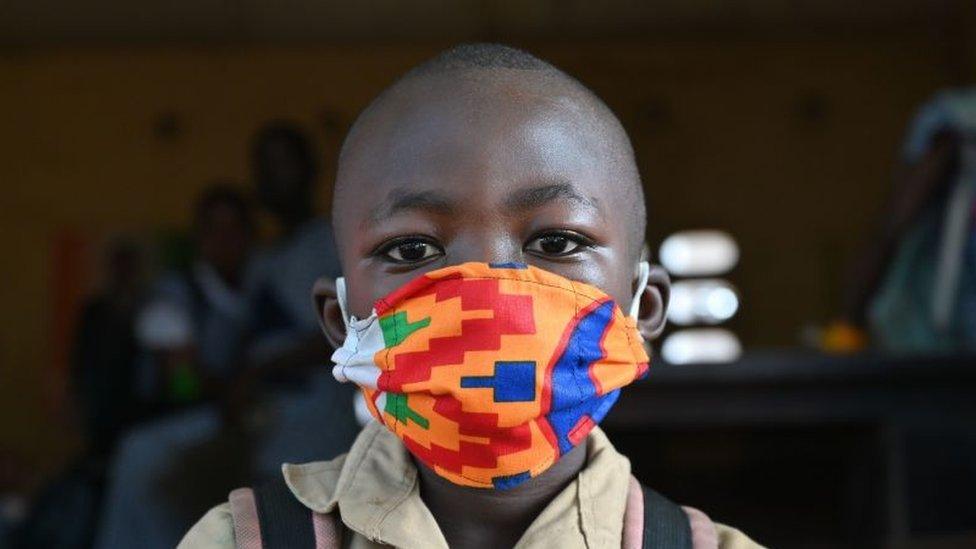
- Published31 December 2021
